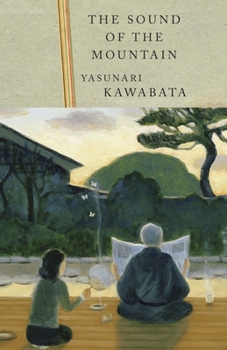The Sound of the Mountain
Select Format
Select Condition 
Book Overview
From the Nobel Prize-winning writer and acclaimed author of Snow Country comes a beautiful rendering of the predicament of old age--about an elderly Tokyo businessman who must face the failures of his memory and the sudden upsurges of passion that illuminate the end of a life.
"A rich, complicated novel.... Of all modern Japanese fiction, Kawabata's is the closest to poetry." --The New York Times Book Review
By...
Format:Paperback
Language:English
ISBN:0679762647
ISBN13:9780679762645
Release Date:May 1996
Publisher:Vintage
Length:288 Pages
Weight:0.48 lbs.
Dimensions:0.7" x 5.3" x 8.1"
Customer Reviews
4 ratings
Synopsis of the story
Published by Thriftbooks.com User , 22 years ago
Written by Nobel-prize winning author Y. Kawabata, "The Sound of the Mountain" is a stunning and complex novel about the family life of Ogata Shingo. Shingo, head of the household, is deeply troubled by the moral decay of his children's families. Shuichi, his son, is married to Kikuko, but carries on an affair for a year, which results in a....... child by his lover and an abortion by his wife. Fusako, Shingo's daughter, separates and later divorces her drug-addicted husband to live with her two young children at her parents' house. Both of Shingo's children disrespect him and think little of him because of his absent-mindedness. These periods of thoughts are filled with beautiful imagery of nature's sounds, smells, and scenes. However, increasingly Shingo's dreams bring him anguish over his moral responsibilty, his hidden love for his daughter-in-law, Kikuko, and his desire for the beauty of his wife's younger sister, his late first wife. In the end, family ties hold this microcosm of Japanese life together--for better or for worse.
One of the Finest Books Ever Written
Published by Thriftbooks.com User , 23 years ago
I love Japanese literature. Unlike American writers - who overdo both their descriptions and their passions - Japanese writers, especially Kawabata, demonstrate taste. Like the beautiful, small cherry blossom, Kawabata's book is exquisite in its understatement. Only in Japanese literature could you have a father-in-law be completely in love with his daughter-in-law and not have the entire thing reduced to some graphic affair. This story is quietly profound. American readers who are in for action or blatant romance will not enjoy it, but if you are a reader who likes a book that makes you recognize your own silent yearnings - then this is the book for you. But I warn you, you will need to read it at least twice to really get it. Since the underlying theme of this novel is the dwindling of life, I recommend reading this novel in the fall or when you are feeling your own body failing.
That's the Sound of Life, That's the Sound of Death
Published by Thriftbooks.com User , 24 years ago
Kawabata Yasunari won the Nobel Prize in 1968 and this novel above all his others, in my opinion, gives readers a chance to find out why. This is a classic of world literature, a work of genius. It is a finely-written tale of family, a simple story about an older man who is fond of his daughter-in-law, though his relations with his own two grown children, son and divorced daughter, are ambiguous. The story line, as in other Kawabata novels, is simple----there are no great events, no dramatic conclusions or climaxes. Natural phenomena---birds, animals, plants, and weather---play a large role in setting the mood and are used as symbols throughout. Far from being a recurring theme, the "sound of the mountain" is heard only once, on page 10, yet it and many other signs presage changes in life that follow a pattern unseen by human eyes. The most amazing thing about THE SOUND OF THE MOUNTAIN is its capacity to summarize or to encapsulate family life, the compexity of family relationships. The only other book I know that comes close is Christina Stead's "The Man Who Loved Children", but that is a most verbose book whose characters verbalize nearly every emotion, or else the author does it for them. Kawabata's novel, however, succeeds in portraying family life equally well, if not better, with an absolute minimum of brush strokes. The indecision, the steps not taken, the regrets, the lost loves who return in dreams---all the myriad small events from which marriages and families are constructed---flow in a way that is both typically Japanese and universal. Shingo, the old man, was particularly kind towards Kikuko, his daughter in law, who "was for him a window looking out of a gloomy house." "Kindness towards her was a beam lighting isolation. It was a way of pampering himself, of bringing a touch of mellowness into his life." There is nothing so definite (or crass) as an out-and-out love affair between the two. Rather, there are solutions that are no solutions, compromises that have to paper over the disappointments. Life goes on and Hollywood is for children. What a brilliant book !
Kawabata's Best Work
Published by Thriftbooks.com User , 24 years ago
This is arguably one of Kawabata's best works. After reading and rereading it over many years, my admiration for Kawabata as a writer only increases. There is something so comforting about the domesticity in this book, despite any problems in the domestic landscape. The style of the book and the writing is pure genius. It captures the essence of the lives it portrays like poetic prose. There is zen in the simplicity and the structure of this book. It makes you want to get up and move to Japan, or at least visit. It makes you want to learn Japanese so that you can read this beautiful writing in the original, even though the Sidensticker translation is great in itself. I'm still thinking about what the sound of the mountain could be. Kawabata is the apex of world literature, and this book is very highly recommended.





